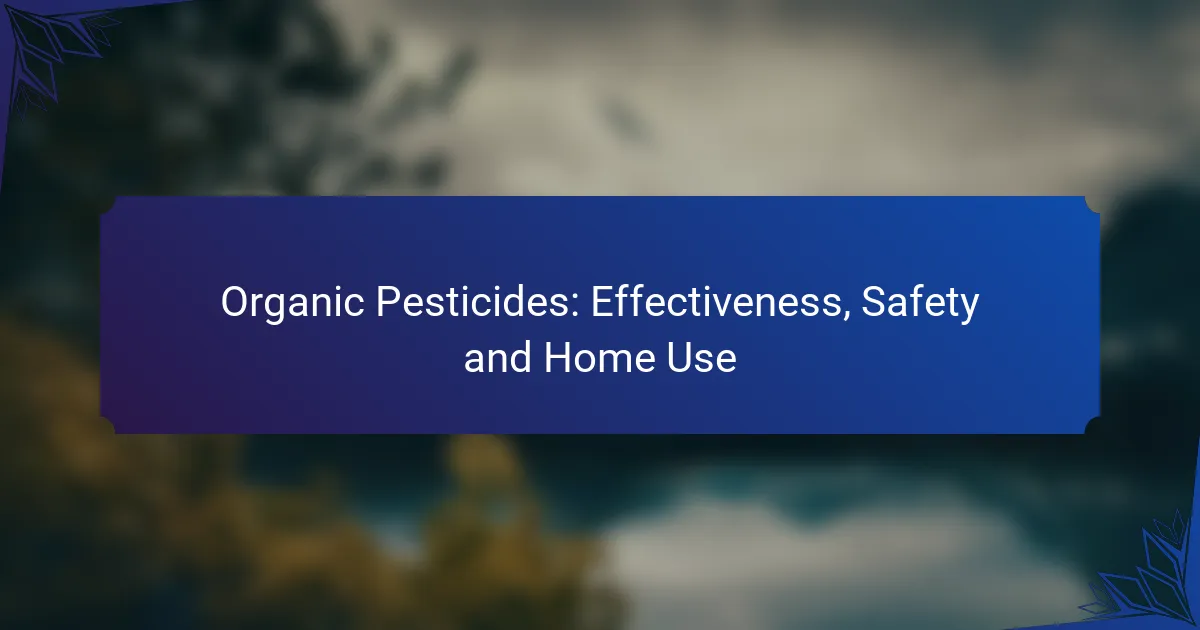Organic pesticides offer a viable solution for managing common garden pests in home gardening. While they are generally safer than synthetic options, it is important to understand their effectiveness and any associated safety concerns to ensure responsible use. Popular choices like neem oil, diatomaceous earth, and insecticidal soap provide effective pest control while maintaining environmental safety.
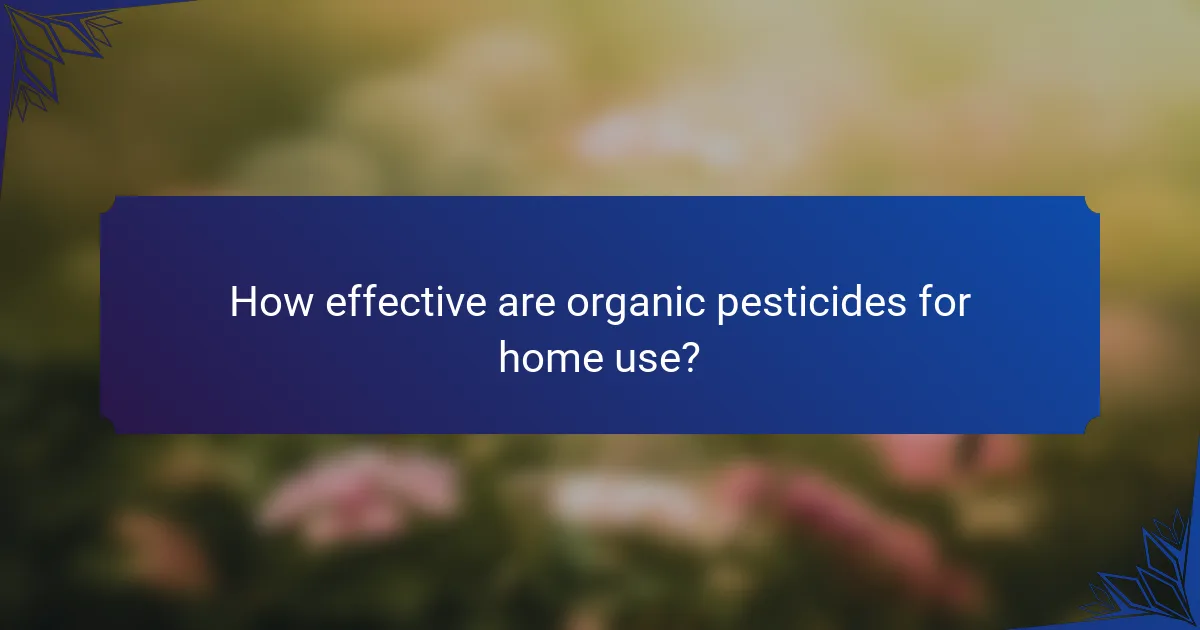
How effective are organic pesticides for home use?
Organic pesticides can be quite effective for home use, particularly against common garden pests. Their effectiveness often depends on the specific formulation and application methods used.
High efficacy against common pests
Many organic pesticides are designed to target specific pests like aphids, spider mites, and whiteflies. Products containing ingredients such as neem oil or insecticidal soap have shown strong results in controlling these infestations. Home gardeners often find that these solutions can significantly reduce pest populations without harming the environment.
For best results, apply organic pesticides during the early morning or late evening when beneficial insects are less active. This timing helps maximize the effectiveness against harmful pests while minimizing impact on non-target species.
Varied effectiveness based on formulation
The effectiveness of organic pesticides can vary widely based on their formulation. Some products may contain a single active ingredient, while others combine multiple compounds for enhanced efficacy. For instance, a mixture of pyrethrin and neem oil may offer broader pest control than either ingredient alone.
Homeowners should read labels carefully to understand the specific pests targeted and the recommended application rates. Testing different formulations can help identify which works best for particular pest problems in your garden.
Impact on beneficial insects
While organic pesticides are generally safer for beneficial insects compared to synthetic options, they can still have negative effects if not used judiciously. Products like neem oil can affect pollinators if applied during their active hours. It is crucial to consider the timing and method of application to minimize harm to beneficial species.
To protect beneficial insects, consider using targeted applications and spot treatments rather than blanket spraying. This approach helps preserve the ecosystem while effectively managing pest populations in your garden.
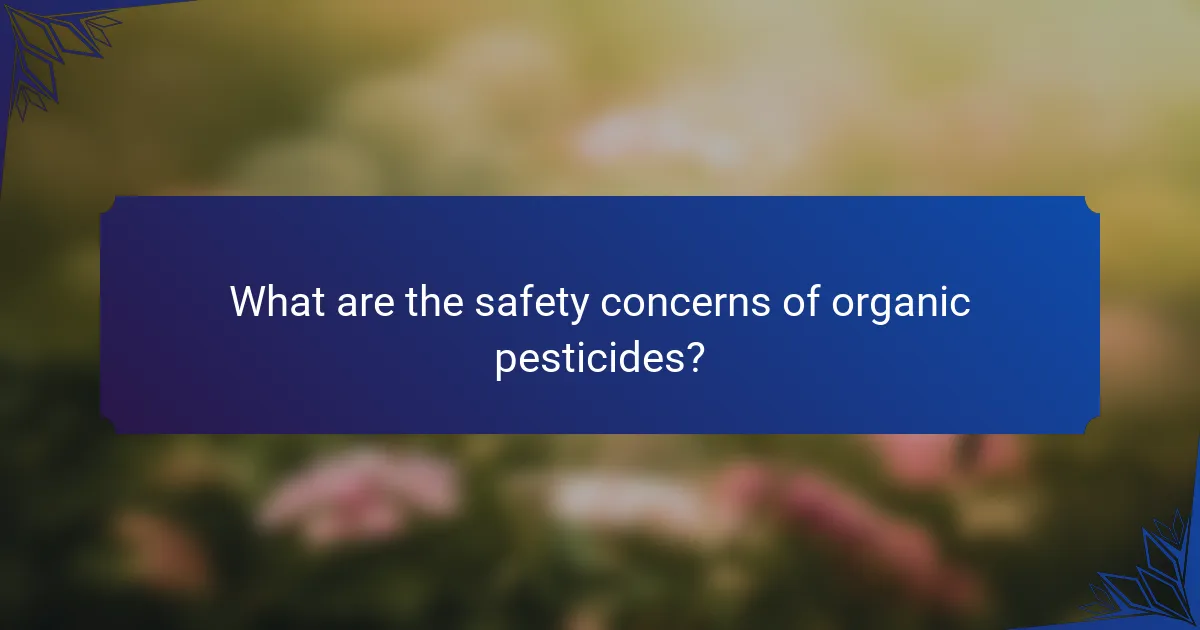
What are the safety concerns of organic pesticides?
Organic pesticides are generally considered safer than synthetic alternatives, but they still pose certain safety concerns. Understanding these risks is essential for effective and responsible use in home gardening and agriculture.
Generally safe for humans and pets
Most organic pesticides are derived from natural sources, making them less toxic to humans and pets compared to chemical pesticides. Common examples include neem oil and diatomaceous earth, which have low toxicity levels. However, it’s still crucial to follow application guidelines to minimize any potential risks.
Always ensure that treated areas are well-ventilated and avoid direct contact during application. Waiting for a specified period before allowing pets or children back into treated spaces can further enhance safety.
Potential allergic reactions
While organic pesticides are safer, they can still trigger allergic reactions in sensitive individuals. Ingredients like essential oils or plant extracts may cause skin irritation or respiratory issues for some people. It’s advisable to conduct a patch test or use protective gear when applying these products for the first time.
Monitoring for any signs of allergic reactions after application is important. If symptoms occur, discontinue use and consult a healthcare professional if necessary.
Environmental impact considerations
Organic pesticides are often touted for their reduced environmental impact, but they can still affect non-target species and ecosystems. For instance, certain organic pesticides can harm beneficial insects like bees if applied indiscriminately. Timing applications to avoid peak activity times for these insects can mitigate such risks.
Additionally, consider the potential for runoff into local waterways, which can affect aquatic life. Using organic pesticides responsibly and in moderation is key to minimizing their environmental footprint.
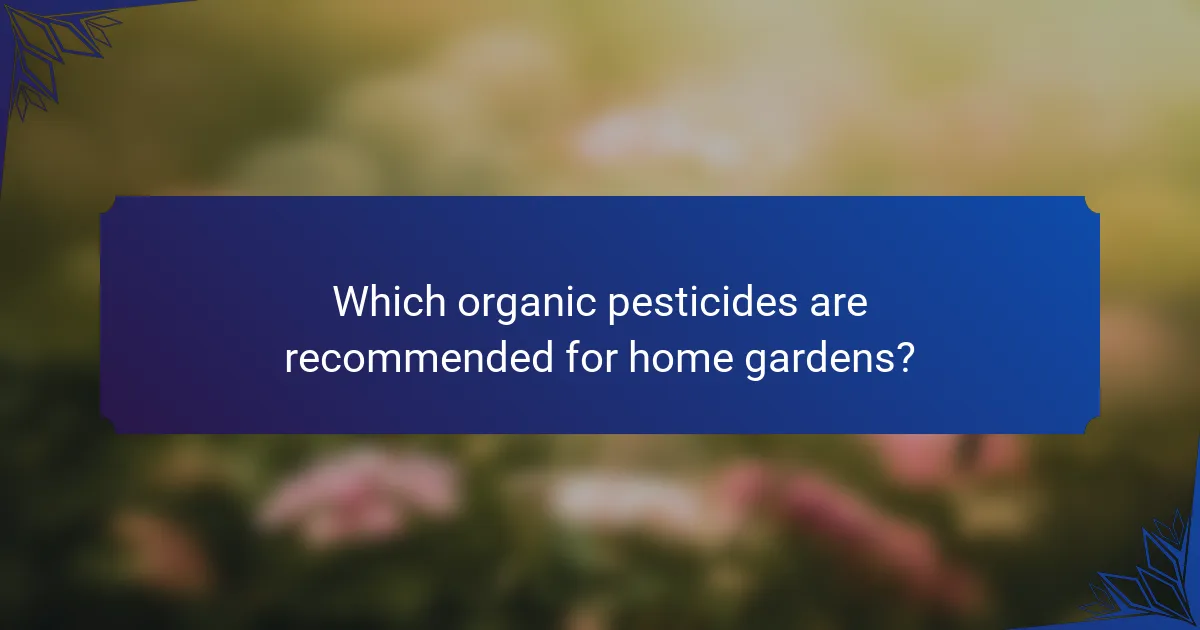
Which organic pesticides are recommended for home gardens?
For home gardens, effective organic pesticides include neem oil, diatomaceous earth, and insecticidal soap. These options are safe for the environment and can help manage various pests without harmful chemicals.
Neem oil for insect control
Neem oil is derived from the seeds of the neem tree and works by disrupting the life cycle of insects. It is particularly effective against aphids, spider mites, and whiteflies. When using neem oil, apply it in the early morning or late evening to avoid harming beneficial insects.
To use neem oil, dilute it with water according to the product instructions, typically around 1-2 tablespoons per gallon. Spray it directly on affected plants, ensuring thorough coverage of both the upper and lower leaf surfaces.
Diatomaceous earth for pest management
Diatomaceous earth (DE) is a natural powder made from fossilized algae that can control a variety of crawling insects. It works by damaging the exoskeletons of pests like slugs, beetles, and ants, leading to dehydration. DE is safe for plants and pets but should be reapplied after rain or watering.
To apply diatomaceous earth, sprinkle a thin layer around the base of plants or on affected areas. Avoid applying it during wet conditions, as moisture reduces its effectiveness.
Insecticidal soap for soft-bodied insects
Insecticidal soap is a contact pesticide that effectively targets soft-bodied insects such as aphids, mealybugs, and spider mites. It works by suffocating the pests and disrupting their cell membranes. This type of pesticide is safe for most plants and beneficial insects when used correctly.
For best results, mix the soap according to the manufacturer’s instructions, usually around 2-3 tablespoons per gallon of water. Spray it directly on the insects, ensuring complete coverage. Reapply every few days until the pest problem is under control.
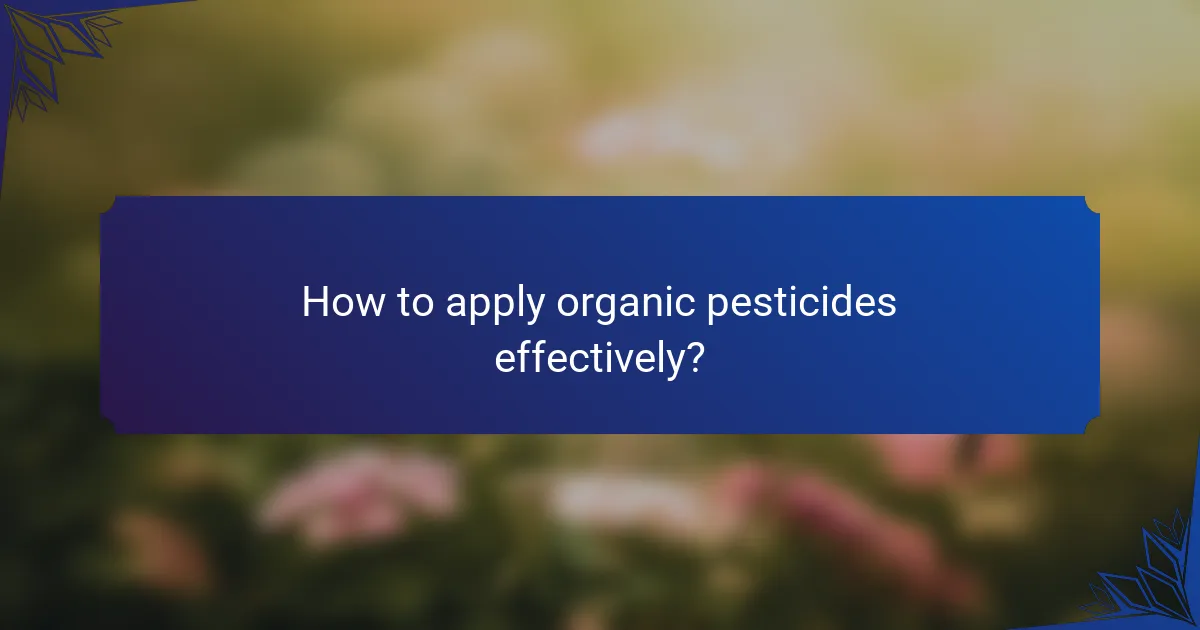
How to apply organic pesticides effectively?
To apply organic pesticides effectively, focus on timing, proper mixing, and the right tools. These factors significantly influence the efficacy of the treatment and ensure safety for both plants and humans.
Application timing for best results
Timing plays a crucial role in the effectiveness of organic pesticides. Apply them during early morning or late afternoon when temperatures are cooler and beneficial insects are less active. This helps maximize the pesticide’s impact while minimizing harm to non-target species.
Additionally, consider the life cycle of the pests you are targeting. For instance, applying pesticides during the early stages of pest development can yield better results than waiting until infestations are more severe.
Proper dilution and mixing techniques
Correct dilution and mixing of organic pesticides are essential for achieving desired results without damaging plants. Always follow the manufacturer’s instructions regarding the recommended dilution ratios, which typically range from 1:10 to 1:20, depending on the product.
Use clean, non-reactive containers for mixing, and ensure thorough agitation to achieve a uniform solution. Avoid mixing different pesticides unless specified, as this can lead to ineffective treatments or harmful reactions.
Tools for effective application
Choosing the right tools for applying organic pesticides can enhance efficiency and coverage. Common options include spray bottles, backpack sprayers, and hose-end sprayers, each suitable for different scales of application.
For small gardens, a hand-held spray bottle may suffice, while larger areas may require a backpack sprayer for better reach and control. Always ensure that the tools are clean and calibrated to avoid over-application or waste.
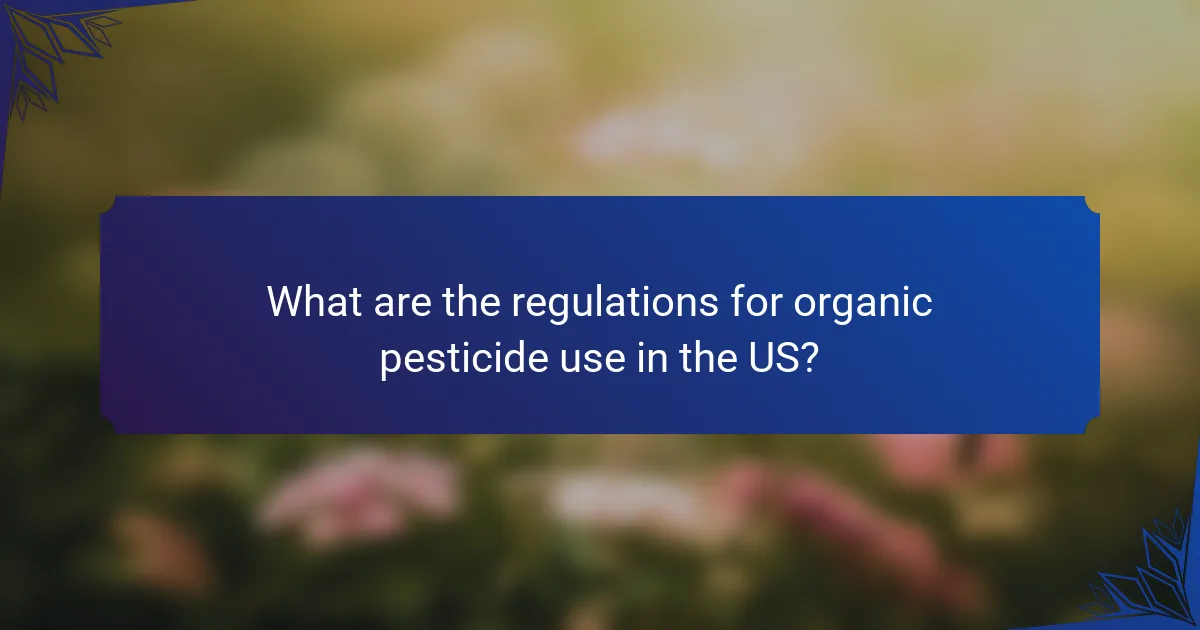
What are the regulations for organic pesticide use in the US?
In the United States, organic pesticide use is regulated by the USDA and the EPA, ensuring that these products meet specific standards for safety and environmental impact. Organic pesticides must be derived from natural sources and comply with the National Organic Program (NOP) guidelines.
EPA guidelines for organic products
The EPA establishes guidelines for organic pesticides to ensure they are safe for human health and the environment. These products must be listed on the EPA’s approved list, which includes substances that meet the criteria for organic farming. The guidelines also require that organic pesticides do not contain synthetic chemicals or harmful additives.
Producers of organic pesticides must provide evidence of their product’s efficacy and safety, which includes conducting scientific studies and submitting data for review. Compliance with these guidelines is essential for maintaining organic certification.
Labeling requirements for consumers
Organic pesticide labels must clearly indicate that the product is compliant with organic standards, including the USDA Organic seal if applicable. Labels should provide detailed information about the active ingredients, usage instructions, and any safety precautions necessary for handling the product.
Consumers should look for labels that specify the product’s approved uses and any restrictions on application, such as waiting periods before harvesting. Understanding these labeling requirements helps consumers make informed choices about using organic pesticides safely and effectively in their home gardens.
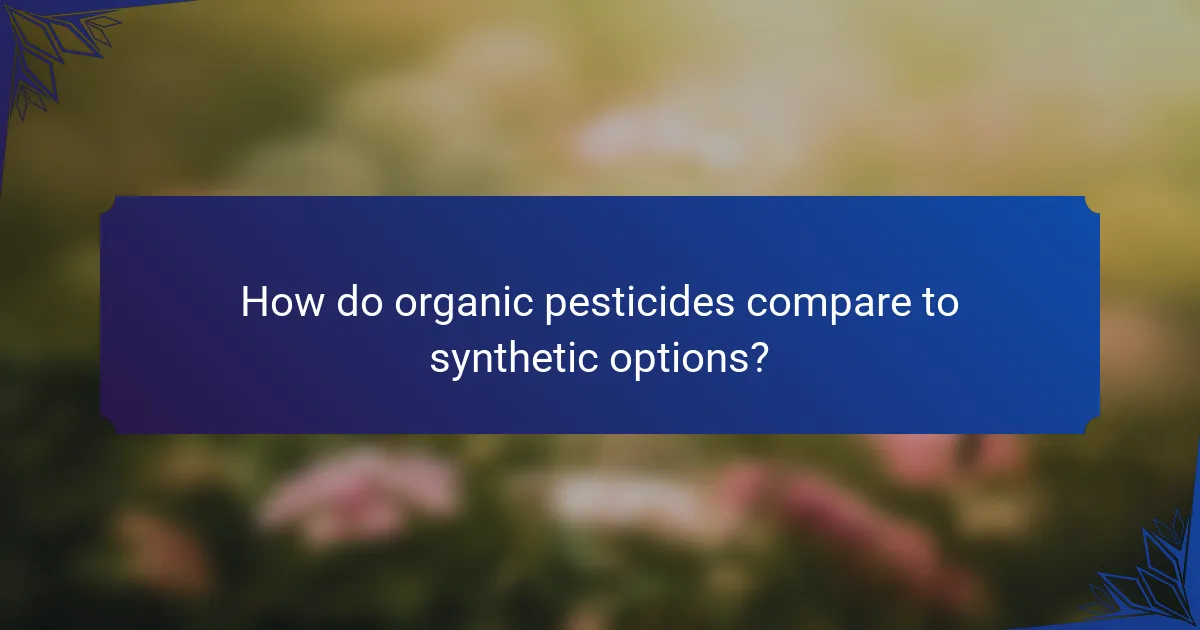
How do organic pesticides compare to synthetic options?
Organic pesticides are generally considered safer for the environment and human health compared to synthetic pesticides. They are derived from natural sources and often break down more quickly, reducing long-term residue in soil and water.
Effectiveness of organic pesticides
Organic pesticides can be effective against a variety of pests, but their efficacy often depends on the specific product and application method. Many organic options, such as neem oil or diatomaceous earth, work by disrupting the life cycle of pests rather than killing them outright.
It’s important to note that organic pesticides may require more frequent applications than synthetic ones, as they tend to have shorter residual effects. Users should monitor pest populations closely and apply treatments as needed to maintain control.
Safety considerations
Organic pesticides are typically safer for humans, pets, and beneficial insects, but they are not without risks. Some organic substances can still cause irritation or allergic reactions, so it’s essential to read labels and follow safety guidelines.
When using organic pesticides, consider wearing protective gear, such as gloves and masks, to minimize exposure. Always apply them in well-ventilated areas and avoid using them during windy conditions to prevent drift.
Home use of organic pesticides
For home use, organic pesticides can be a practical choice for managing pests in gardens and on indoor plants. Homeowners should select products that are specifically labeled for the pests they are targeting.
Common organic pesticides include insecticidal soaps, garlic sprays, and essential oils. It’s advisable to test a small area first to ensure that the treatment does not harm the plants. Regular monitoring and integrated pest management strategies can enhance the effectiveness of organic solutions.
